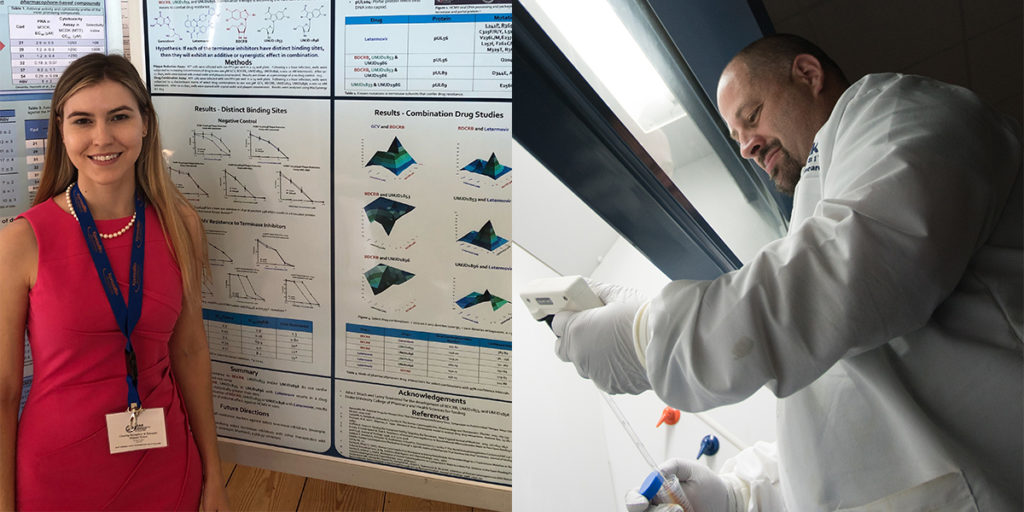
Dr. Brian Gentry and Dr. Marc Busch were awarded a multi-year $390,000 Merck Investigator Studies Program (MISP) grant to study letermovir, an antiviral drug used to treat infections that occur in patients with compromised immune systems. The Drake researchers will be studying the disruption that letermovir causes on the virus that causes life-threatening infections.
This grant was the outcome of a student project and presentation. In May 2017, Kylie Markovich, PH’19, approached Associate Professor of Pharmacology Brian Gentry with a desire to collaborate on research. She was looking to expand her knowledge of infectious diseases while gaining a better understanding of the research process. Gentry’s sole available project had so many variables he wasn’t sure if it would end with success.
“It was a very big ‘what if’ type of project,” said Gentry. “Most of the time when I undertake a research project, I have a high level of certainty that it will work based on what has been done in the past and what is currently known.”
He reiterated that this project had several “what ifs” associated with it, but Kylie said she was excited to undertake such a project as it provided the opportunity to take big scientific risks that could lead to big scientific rewards. After working out specific techniques needed for the study, she was able to generate the first positive proof that the theory Professor Gentry and his mentor, University of Michigan Professor John Drach, had developed on how these drugs work was the most likely explanation.
The research resulted in two main outcomes: Gentry wrote a substantial review article that was published in the prestigious journal “Antiviral Research,” outlining his ideas for how these drugs work, and Kylie put together a research poster to present at the 31st Annual International Conference on Antiviral Research (ICAR) in Porto, Portugal in June, 2018. At the conference, Kylie conversed with Cam Douglas, the target identification lead for infectious disease research at Merck, who was interested in how she had formulated her project and the results that were generated. That led to a substantial discussion between Douglas and Gentry about Gentry’s thoughts on terminase inhibitors, how they work, and the implications on their function.
After returning to the U.S., Douglas suggested Gentry submit a Merck Investigator Studies Program (MISP) grant. Gentry then reached out to Marc Busch, associate professor and chair of the biology department, about methods to separate out the many different individual functions of the terminase enzyme.
“The viral terminase protein has one function, but many individual pieces make up that function,” said Gentry. “Disruption of any of those pieces would lead to loss of function, so separating out each piece to determine which drug disrupts which piece is key to this proposal.”
Merck is the only company with a terminase inhibitor available for use in the U.S. at this time. However, it is not yet known how the drug works at a molecular level (i.e. which piece of the terminase complex letermovir works on), according to Gentry.
After many conversations and extensive planning, Busch and Gentry developed a proposal that would differentiate each of the pieces, allow them to study natural virus function, and then study disruption (or lack thereof) when the drug is introduced.
The project that they received funding for will continue for three years, will involve several students as researchers, and allow for the hire of a full-time researcher to carry out the work, to ensure that this is accomplished in a reasonable amount of time. All of the research work is expected to be completed in Drake’s new Science Connector Building which already had all of the equipment necessary to conduct the research. “This work at a benchtop level has important clinical implications. Namely, when you talk about drug resistance and cross-resistance, drug interactions, and adverse effect profiles; that is why Merck is so interested in this research,” said Gentry. “This grant is the first step. If Dr. Busch and I can generate data from this proposal like we think we will, this could very well lead to another MISP to explore more complex problems associated directly with letermovir.”

